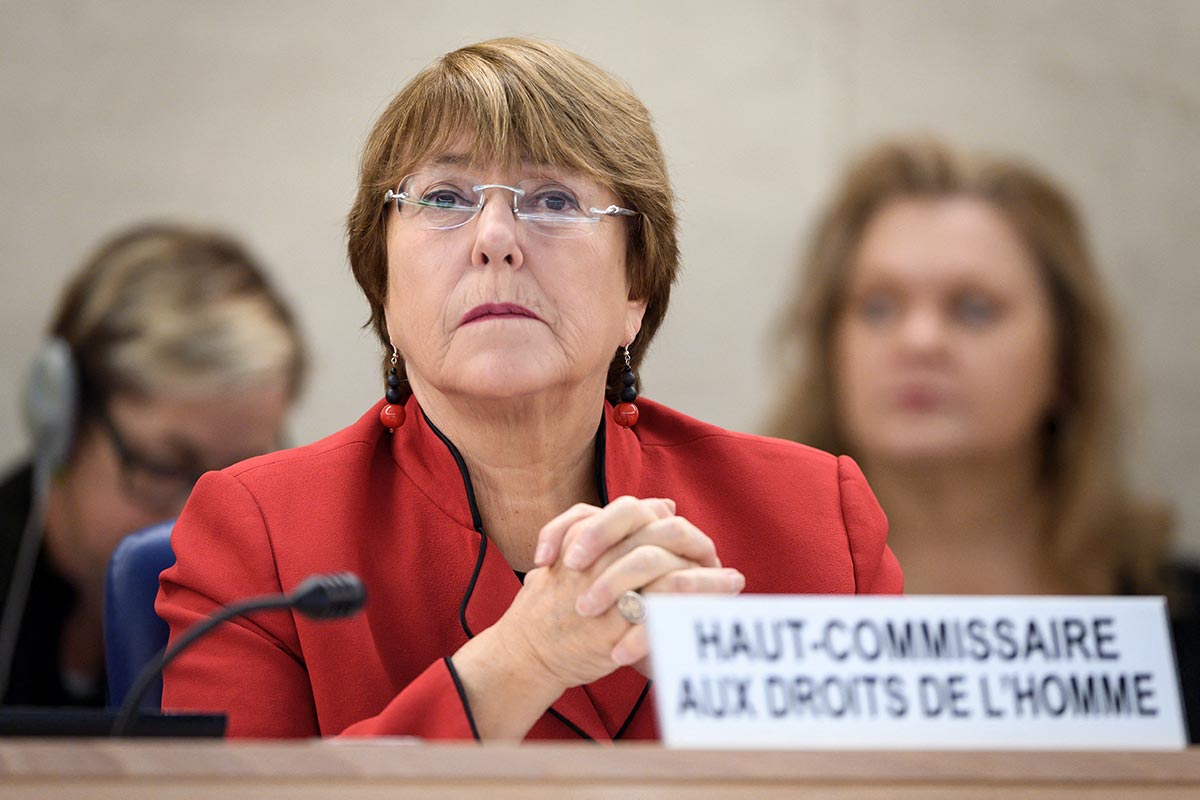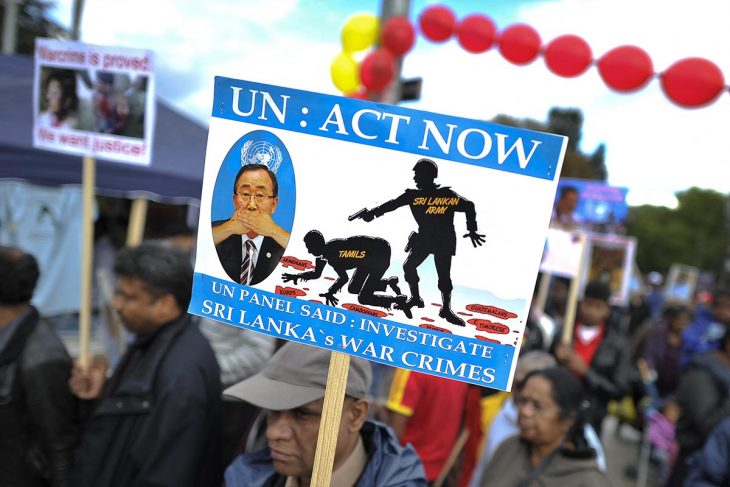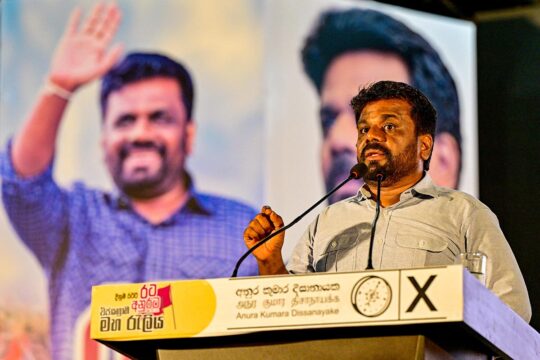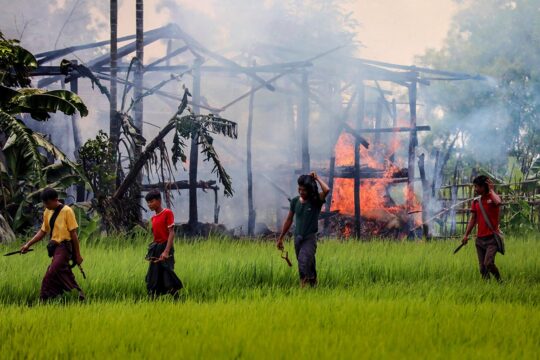Nearly 12 years after the end of the civil war in Sri Lanka, there is still no accountability for grave crimes that likely constitute war crimes and crimes against humanity, Michelle Bachelet told the United Nations (UN) Human Rights Council on February 24. The High Commissioner for Human Rights said the UN had failed to live up to its prevention role in Sri Lanka and must not make the same mistakes in the face of “early warning signs” of further violations. Under the current government there has been increasing militarization, restriction of civil space and “discriminatory rhetoric from State officials at the highest levels” against Muslim and Tamil minorities, which risks “generating further polarization and violence”, according to Bachelet’s report.
She called on member states to consider new options, such as a referral to the International Criminal Court (ICC), universal jurisdiction cases against Sri Lankan officials implicated in war crimes, or an international evidence-gathering body. Members of the Tamil community broadly welcomed Bachelet’s report, which is “tough” in comparison with previous ones, according to Kannanathan Rajganna, a member of the Sri Lankan diaspora in Switzerland and chairman of a new NGO, International Humanitarian Approach. But he says Tamils are saddened that the UN has not taken strong action in more than a decade. “In the Tamil diaspora, the main thinking is that there should be a criminal investigation, especially focussing on what happened in 2009,” says Rajganna. He thinks the Sri Lankan government has just been playing for time and removing evidence.
New evidence-gathering means
In the wake of Bachelet’s report, the Human Rights Council on March 23 adopted a UK-led resolution expressing “serious concern” and calling on Sri Lanka to implement the recommendations in her report. The March 23 resolution also “decides to strengthen (…) the capacity of the Office of the High Commissioner to collect, consolidate, analyse and preserve information and evidence and to develop possible strategies for future accountability processes for gross violations of human rights or serious violations of international humanitarian law in Sri Lanka, to advocate for victims and survivors, and to support relevant judicial and other proceedings, including in member states, with competent jurisdiction”. The resolution was backed by 22 countries and opposed by 11, including China and Pakistan. There were 14 abstentions, including Sri Lanka’s big neighbour India.
But the total additional budget requirement approved with the resolution is only $2,856,300 (for 2021 and 2022), and still to be approved by the UN General Assembly at its 76th session in September. Human Rights Watch hopes the new evidence gathering capacity will enhance international scrutiny of rights violations in Sri Lanka. It says that with this resolution, the cause of Sri Lankan victims “has taken an important step forward, by creating a powerful investigative mechanism to prepare international prosecutions”. Amnesty International also welcomed it, but underlined that “the real impact of further monitoring and reporting will rely on other UN member states using the resolution as a basis for concrete action, including investigations and prosecutions under universal jurisdiction and a possible referral to the International Criminal Court.”

Sri Lankan government in “abject denial”
Sri Lanka’s civil war lasted some 25 years, pitting the majority Sinhalese government against the Liberation Tigers of Tamil Eelam (LTTE), which fought for a separate homeland for minority Tamils in the north and east of the country. Grave crimes were committed on both sides. For example, the LTTE used suicide bombers and child soldiers. Government, especially in the final stages of the war, was brutal. The conflict ended with a massive assault in 2009, in which tens of thousands of Tamil civilians died. Current president Gotabaya Rajapaksa, who was defence chief at the time, is widely seen as the man who ordered the final assault.
Successive governments have promised reconciliation and accountability measures. The previous government of Maithripala Sirisena co-sponsored a Human Rights Council resolution in 2015 with a road-map for transitional justice which appeared to raise hope. There was little follow-up, although it did launch a probe into war-era disappearances and a government Office for Reparations. Proposals for a war crimes court and truth and reconciliation commission remain a dead letter.
Charu Lata Hogg, an associate fellow on the Asia-Pacific programme of United Kingdom think-tank Chatham House, says the origins of impunity lie in lack of independence of Sri Lanka’s judicial and other institutions, which go back to its independence from Britain in 1948. But this is getting worse under the current government, according to Bachelet’s report. It says, for example, that a constitutional amendment in October 2020 “has fundamentally eroded the independence of key commissions and institutions, including the Human Rights Commission of Sri Lanka, the Election Commission, the National Police Commission and the judiciary”.
Plus, says Hogg, it is the same people in power now as in 2009, so that “it’s like calling individuals to investigate and prosecute themselves – it’s not going to happen”. She says the current government sees what happened as a war on terrorism and chooses not to address the underlying issues that led to the war in the first place. “It is in abject denial,” she told Justice Info.
“Alternative international options”
Bachelet says that “domestic initiatives have repeatedly failed to ensure justice for victims and promote reconciliation”, and urges UN member states to “pursue alternative international options for ensuring justice and reparations”. Sri Lanka is not a party to the Rome Statute of the ICC, so the only possibility for that Court to get involved would be a referral from the UN Security Council. This seems highly unlikely, says Hogg, as it would almost certainly be vetoed by China and Russia.
And what about universal jurisdiction cases in other countries? “As the Syria cases have revealed, universal jurisdiction provides a promising way forward,” says Hogg. There have been some attempts. For example, in 2011 two NGOs including TRIAL International filed war crimes complaints with Swiss authorities against former general Jaghat Dias, who was at the time Sri Lanka’s deputy ambassador to Germany and Switzerland. But he was recalled to Sri Lanka, escaping possible judicial proceedings. “In the case of Sri Lanka, TRIAL International believes that universal jurisdiction is currently one of the few tools that would allow Sri Lankans to benefit from some degree of justice, even if outside the country,” says Jennifer Triscone, legal advisor at the Swiss NGO.
Although not strictly a universal jurisdiction case, the daughter of assassinated journalist Lasantha Wickrematunge sought to hold Rajapaksa – now president of Sri Lanka – responsible in a US court for her father’s murder in January 2009 and “the widespread and systematic targeting of journalists perceived to be critical of the government”. The Ninth Circuit Court of Appeals in San Francisco dropped the case this month, after a ruling that the president has immunity as head of state. But it did not rule out future litigation against Rajapaksa once he no longer enjoys immunity.
ONGOING GENOCIDE AGAINST TAMILS?
Current president of Sri Lanka Gotabaya Rajapaksa, whose brother is currently Prime Minister, was elected in November 2019. This followed the devastating Easter church bombings that same year, claimed by Islamic State. Rajapaksa and his brother were given an overwhelming mandate from the country’s mainly Buddhist Sinhalese majority for “nationalistic and militarized” government, Charu Lata Hogg, an associate fellow on the Asia-Pacific programme at Chatham House, told Justice Info.
Kannanathan Rajganna, chairman of a new NGO, International Humanitarian Approach, says the country’s mainly Hindu Tamils want action on an ongoing “genocide”. He points to a report by the United States think-tank Oakland Institute that says “government driven Sinhalese colonization is growing within Tamil areas with the intent to change demographics and deny Tamil communities access to their land”. This report also says government departments — including the Mahaweli Authority, Archaeological Department, Forest Department, and Wildlife Department – are being used to undermine Tamil culture and religion, including building Buddhist temples on Tamil land.
Is it genocide? “That is a legal determination,” says Hogg. “What is clear is that after years of political discrimination and marginalization in employment and development, Tamils in the north and east live under huge militarization.” Although Buddhism is enshrined in the Constitution as the state religion, she says there has so far been a secular tradition. The current government has put this aside, with Buddhist temples and statues being put up all over the country. “No other government has enforced Buddhist religion and practice,” she told Justice Info.







